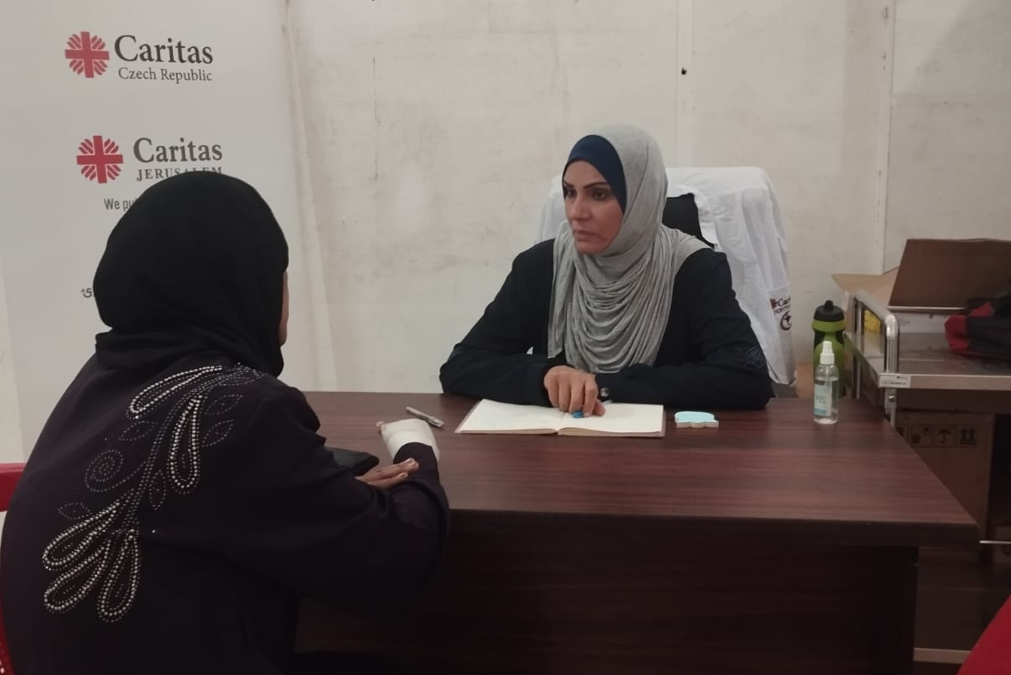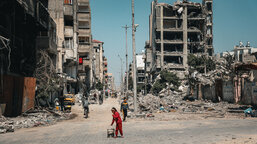Since October 2023, the Gaza Strip has been facing a profound humanitarian crisis. The civilian population is repeatedly displaced and faces a severe shortage of essential resources, including drinking water, food, medicine, and electricity. The area is entirely cut off from the outside world, with no safe refuge and no means of escape. In this environment, Caritas Czech Republic is working to assist. With its team on the ground in Gaza, the organisation delivers basic healthcare, psychosocial support, and humanitarian aid.
Salam (26): Crisis intervention saves lives
Salam is a young mother of four. When she reached out to a crisis hotline, she was at the end of her strength. Her family had neither food nor shelter. She had witnessed her home being destroyed by bombs. During the conflict, she lost ten members of her family – nine cousins and her brother, a loss she has not yet been able to process emotionally. For the third time in a short period, she attempted to end her life, and there was a serious risk that suicidal thoughts might return.
During the call, a crisis line worker from the Palestinian organisation Sawa provided her with a safe space to share her emotions. They listened, offered reassurance, and helped her plan the coming hours and days. The worker also advised Salam where to find the necessary support in her immediate surroundings. Crisis intervention does not end with a phone call – quite the opposite. It is followed by support from social workers directly in the field.
Rajaa (65): Forced to leave home ten times
The story of sixty-five-year-old Rajaa also reflects the reality faced by thousands of families. She is the mother of five children. Due to the conflict, she lost her home and her husband, and she has had no news of her son for several weeks. She does not know whether he is still alive. Her daughters, for whom she is the sole carer, have intellectual disabilities. Since the beginning of the conflict, Rajaa has been displaced ten times. She moved from the north to the south of Gaza and back again. During a temporary ceasefire, she returned to her damaged home in Jabalia, only to be forced out once more by tanks and relentless shelling.
"Every day I prayed to God to take us," she admitted when she arrived, exhausted, at the Caritas clinic in Gaza. The doctors treated her and gave her space to express her feelings. Thanks to the swift coordination of local staff, she was granted asylum in a camp, where she now lives in a family tent with her daughters. They receive daily food, essential medicines, and hygiene supplies.
Thanks to God, I can sleep again without worrying about rent or food. I feel human again,
she confided.
Our staff are present on the ground
Caritas Czech Republic is one of the few organisations with its team in Gaza. In cooperation with Caritas Jerusalem and the local partner SAWA, it provides:
- basic healthcare,
- medicine distribution,
- individual social assistance (case social work),
- crisis telephone intervention,
- and training for social workers and psychologists.
The distribution of humanitarian aid in Gaza is severely restricted. The original UN system has been replaced by a military mechanism that controls four distribution points for two million inhabitants. People are forced to gather in overcrowded, militarised zones and risk their lives – simply to obtain food.
In a civilised world, it should be utterly unacceptable for people to have to risk their lives just to secure food for survival,
said Jan Líska, institutional funding advisor at Caritas Czech Republic, in an earlier interview with Czech television.
Even the partial unblocking of aid in recent days is neither sufficient nor acceptable. The limited amount of assistance reaching the area cannot meet the basic needs of two million people suffering from hunger and malnutrition. Caritas has therefore joined more than 200 non-governmental organisations calling for a return to a standard humanitarian system led by the United Nations. The current situation is in violation of international humanitarian law.
War is often reduced to mere statistics – numbers of casualties, distribution points, days without electricity. But behind every number is a face. A mother who has left her home ten times. A young woman desperately calling a helpline. A worker bringing hope where it has long since faded.
The assistance provided by Caritas Czech Republic is a drop of hope in a sea of despair. But for Salam and Rajaa, it means everything.
Donate and help people in Gaza












